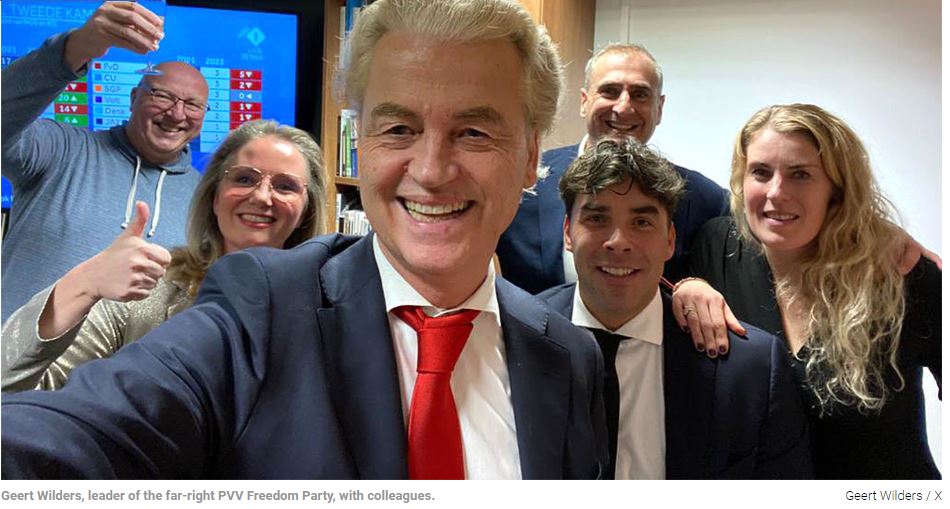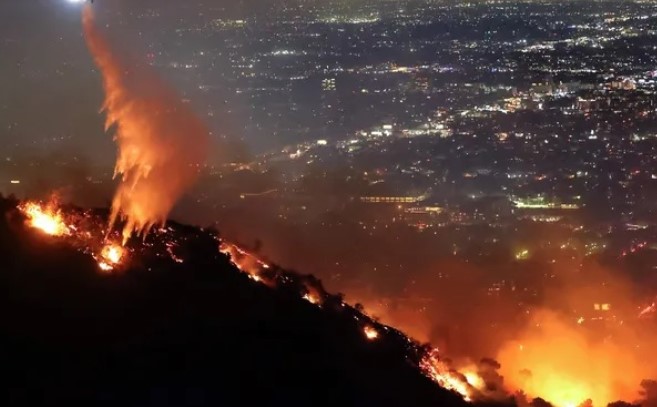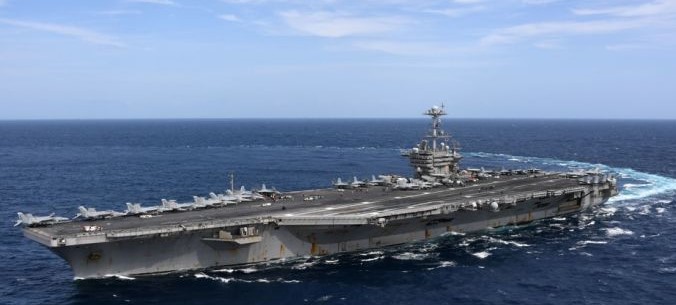
Gerd Wilders
STRATEGIC ASSESSMENT. Viewers across Russia saw state television celebrate the “stunning” victory of far-right populist Geert Wilders in last week’s Dutch elections. With his party winning 37 out of 150 parliamentary seats — 12 more than the center-left GL/PVDA in second place — the result came as a shock for Europe and good news for the Kremlin.
Wilders, who rose to notoriety with proposals to ban the Quran and close mosques, has shown an affinity for President Vladimir Putin’s Russia. In 2018, four years after 193 Dutch nationals were killed in the downing of flight MH17 over eastern Ukraine, he traveled to Moscow and met with senior Russian politicians, “proudly” wearing a pin heralding Dutch-Russian friendship. A spokesperson for the center-left D66 party called him “Putin’s useful naïf” for the visit, in which Wilders praised Putin for “standing up for the Russian people.”
Wilders believes that the Netherlands must end its military support for Ukraine. His Party for Freedom (PVV) — of which he is the only member — declares in its manifesto that the Netherlands should “not send our money and defense equipment such as F16s to Ukraine.” Instead, it says, the Dutch should “keep it for our own armed forces.”
Wilders has long been highly critical of the Netherlands’ governing centrist coalition, which has taken a strong stance on the war. Outgoing Prime Minister Mark Rutte, a strong favorite to become the next Secretary-General of NATO, pushed the U.S. to step up its supplies of materiel such as tanks. Elsewhere, Rutte’s government took the lead as the largest founding member of a coalition providing Ukraine with F16 jets.
A Wilders premiership would change that, turning the Netherlands’ staunch defense of Ukraine into skepticism, perhaps even jeopardizing the promised dozens of fighter jets Ukraine desperately needs.
Whether Wilders’ ideas become policy will depend on whether he manages to form a new government, and who his partners would be if successful. Despite having won the most seats in a chamber where two-thirds are held by other right-wing parties, gaining the support of a majority of parliamentarians will not be easy. One of the more likely coalition partners, the pro-Ukrainian, center-right Party of Freedom and Democracy (VVD), has already announced it would not enter into government with the PVV, instead choosing to support policies on a case-by-case basis.
The other major party on the right, Pieter Omtzigt’s New Social Contract, supports military and financial aid for Ukraine, NATO membership for Kyiv, and a tribunal for Russian war criminals in The Hague. A failure by Wilders to form a new government would probably lead to new elections, which could leave him in an even more powerful position.
Even if Wilders does not manage to form a government straight away, his victory poses challenges. As in Slovakia, where Robert Fico replaced a pro-Ukranian government, it deals a blow to the EU’s promise that it would support Ukraine for “as long as it takes.”
Instead of convincing the Kremlin that it will not be able to achieve victory on the battlefield, it signals that Moscow’s strategy of waiting for Europe’s support for Kyiv to wane is working. In doing so, the doves like Wilders are self-defeating. Their desire for peace convinces the Kremlin that a longer war will lead to Russia’s victory at the cost of even more lives.
The decimation of the Dutch centrist coalition, which lost almost half its seats, sends a message to other European leaders. Wilders’ campaign largely steered away from addressing the issue of Ukraine explicitly. Instead, he weaponized concerns around immigration and nativism to mobilize a broad range of disaffected voters. Similar issues are at play elsewhere in Europe. The European Parliament will go to the polls this spring, and leaders are mindful of the threat the extreme right poses to their own positions.
A shift in stance would come at a bad time for both Ukraine and Europe. The war the Kremlin expected to last three days is approaching its third year. Kyiv’s vaunted summer counteroffensive has failed to replicate the sweeping gains of late 2022, leaving the country in desperate need of rearming just as critical support from Washington becomes harder to secure. All this means that European support is needed more than ever, not less.
During an upcoming meeting of EU leaders in December, the European Council will try to strike a deal setting Ukraine along the path to membership, which is at risk of being vetoed by an obstructionist Hungary. A deal is needed before Hungary takes over the Council’s rotating presidency in July 2024, which would inevitably further dash President Volodymyr Zelensky’s ambitions for his country. Wilders’ victory serves as an unwelcome reminder to pro-Ukrainian leaders that time may not be on their side — and neither may be their electorates.
Of course, there are caveats to concerns about Wilders’ success. Despite becoming the largest party, the PVV received less than 25% of the vote in an election where Ukraine did not feature as a major issue, indicating there may be little support among the Dutch people for abandoning Kyiv.
Earlier this year the election of far-right Giorgia Meloni as Italian prime minister sparked fears that Rome would withdraw its support for Kyiv. But upon taking power, she continued her country’s firm pro-Ukrainian stance. After the war started, Wilders hardened his stance on Russia, declaring it in his manifesto to be the aggressor. Unlike Meloni, however, he has shown no sign of shifting his position on support to Ukraine.
A Wilders premiership would still mean a dramatic shift for what was previously one of Ukraine’s staunchest supporters in Western Europe, both in terms of direct deliveries of military aid and political support at the European level.
Even if he doesn’t succeed, the Kremlin has reason to celebrate. By showing the strength of a populist right running on an own-citizens-first message when EU support to Ukraine is most needed, he is undermining the common front European leaders have tried desperately to show. Putin believes that time is on his side. The slow decline of Europe’s support for Ukraine shows he may be proven right.
Pieter Garicano is an analyst who has written about Dutch politic for Vozpopuli.





